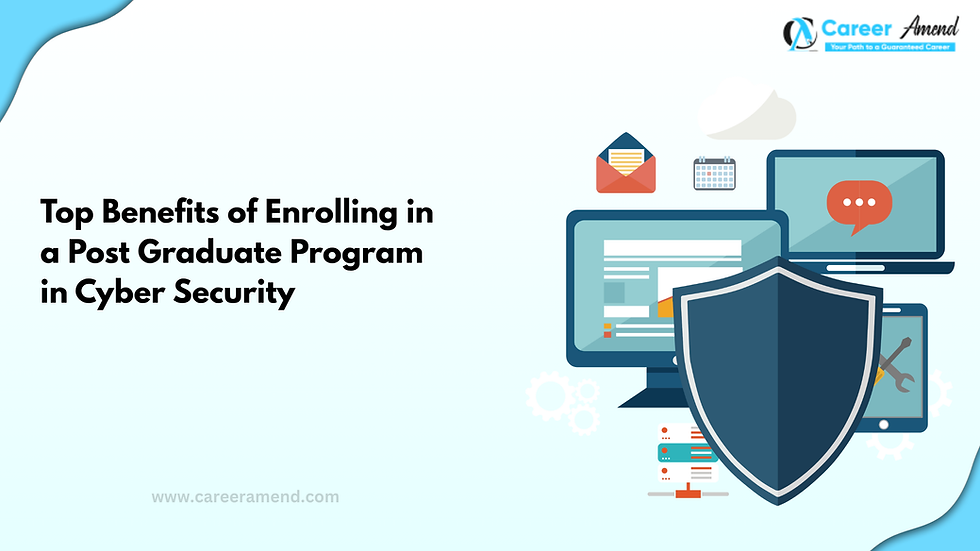Top Benefits of Enrolling in a Post Graduate Program in Cyber Security
- Career Amend
- Jul 21, 2025
- 7 min read

Introduction:
In today’s hyper-connected digital landscape, cyber threats have become more complex, aggressive, and far-reaching than ever before. From ransomware attacks that cripple healthcare systems to phishing scams that exploit sensitive customer data, cybercrime is costing global organizations billions annually. As businesses migrate to cloud platforms and integrate AI-driven systems, the demand for robust cybersecurity solutions is only increasing.
This has created an urgent need for well-trained, highly qualified cybersecurity professionals. One of the most effective ways to gain this expertise is by enrolling in a Post Graduate Program in Cyber Security. These programs not only provide in-depth knowledge and training but also prepare professionals to take on leadership roles in the cybersecurity domain.
What Is a Post Graduate Program in Cyber Security?
A Post Graduate Program in Cyber Security is an advanced-level academic and professional course designed to equip learners with the skills required to safeguard digital assets. Whether you’re a recent graduate or a working professional aiming to shift careers or upskill, this program offers a structured learning path that bridges theoretical knowledge with real-world application.
Key Features of a PGP in Cyber Security Course:
Curriculum: Topics often include network security, ethical hacking, cryptography, risk management, cloud security, and incident response.
Hands-On Labs: Many programs include simulation-based labs and real-time cyberattack scenarios.
Tools and Technologies: Students work with industry-standard tools like Wireshark, Metasploit, Kali Linux, Splunk, and more.
Certifications and Projects: Learners often earn certifications and complete capstone projects to demonstrate expertise.
Eligibility: Typically open to graduates from IT, computer science, engineering, or related fields.
PGP in Cyber Security courses are structured to address current and emerging threats while giving students a foundation in core concepts. Some also offer elective modules in advanced areas such as blockchain security or AI in cybersecurity.
Benefit #1: Industry-Relevant, In-Demand Skills
One of the strongest benefits of enrolling in a PGP in Cyber Security course is the development of industry-relevant skills that are immediately applicable in professional environments. Cybersecurity is not just about firewalls and antivirus software anymore; it now encompasses advanced areas like:
Penetration Testing
Digital Forensics
Zero Trust Architecture
Security Information and Event Management (SIEM)
Compliance and Regulatory Frameworks (GDPR, HIPAA, PCI-DSS)
The Post Graduate Program in Cyber Security is designed with input from industry experts to ensure the skills you learn are up to date with what employers actually need. This gives students a significant edge in the job market and the ability to hit the ground running from day one.
Moreover, many programs include live industry projects and hands-on labs that allow you to apply what you've learned in real-world scenarios. This not only builds confidence but also enhances your professional portfolio.
Benefit #2: Enhanced Career Opportunities and High-Paying Roles
Cybersecurity professionals are in high demand across industries such as finance, healthcare, e-commerce, government, and IT services. Enrolling in a Post Graduate Program in Cyber Security opens doors to a wide range of lucrative job roles, including:
Cybersecurity Analyst
Security Engineer
Penetration Tester (Ethical Hacker)
Information Security Manager
Chief Information Security Officer (CISO)
Cloud Security Architect
Incident Response Specialist
Salary Prospects in India and Globally:
Entry-level roles typically offer ₹6–10 LPA in India, while experienced professionals can earn upwards of ₹25 LPA or more.
Globally, cybersecurity professionals earn between $80,000 to $150,000 USD annually, depending on specialization and location.
Thanks to the rise of hybrid work and global digitalization, cybersecurity roles are not only high-paying but also offer remote working options and global mobility. A PGP in Cyber Security course gives you a solid credential that employers recognize and value.
Benefit #3: Access to Cutting-Edge Cyber Security Technologies
Enrolling in a Post Graduate Program in Cyber Security means you'll have access to the most current and advanced technologies in the field. With the constant evolution of cyber threats, tools and strategies must also evolve. Top-tier PGP programs offer students exposure to:
AI and Machine Learning in Threat Detection
Blockchain for Secure Transactions
Cloud Security Solutions (AWS, Azure, GCP)
IoT and Mobile Security Techniques
Security Automation Platforms
Students are trained to use platforms and software that are prevalent in modern cybersecurity ecosystems, such as:
Splunk for SIEM and threat detection
Kali Linux for ethical hacking
Nmap and Nessus for vulnerability scanning
Burp Suite for web application security testing
This practical experience ensures that learners can confidently navigate any cybersecurity environment and respond to dynamic threats effectively.
Benefit #4: Learn from Industry Experts and Real-World Projects
A standout feature of any quality PGP in Cyber Security course is the opportunity to learn from experienced faculty and industry professionals. These experts bring insights from their real-world experiences, offering you more than just textbook knowledge.
What You Gain from Expert Instruction:
Case studies based on actual data breaches and response strategies
In-depth analysis of emerging threats and mitigation frameworks
Tips on career building, certifications, and interview preparation
Access to exclusive webinars, workshops, and mentorship sessions
Most Post Graduate Programs in Cyber Security also include a capstone project or a series of real-world assignments that simulate job-like responsibilities. These projects can involve:
Designing a cybersecurity framework for a fictitious company
Conducting penetration testing on simulated networks
Preparing an incident response plan
Writing compliance documentation for regulatory standards
Such hands-on exposure significantly boosts your confidence and makes your resume stand out. These experiences mirror the challenges professionals face in real-life cybersecurity roles, providing learners with an authentic and practical edge.
Benefit #5: Flexible Learning for Working Professionals
One of the biggest advantages of a Post Graduate Program in Cyber Security is its flexible learning structure, making it ideal for working professionals who want to upskill without pausing their careers. Most modern PGP in Cyber Security courses are designed with working individuals in mind, offering a blend of convenience, structure, and interaction.
Key Flexibility Features:
Online and Hybrid Learning: Study from anywhere without disrupting your job or personal responsibilities.
Self-Paced Modules: Progress through the curriculum at your own speed with access to recorded lectures and downloadable content.
Weekend or Evening Classes: Live sessions scheduled after work hours or on weekends to suit busy schedules.
Mobile Access: Learn on the go using mobile apps and cloud-based platforms.
This flexible approach to learning ensures that professionals from various industries—whether in IT, banking, healthcare, or government—can balance their job responsibilities while gaining critical cybersecurity skills. The PGP in Cyber Security course becomes more than just education—it becomes a career enabler tailored to your lifestyle.
Benefit #6: Globally Recognized Certification
Completing a Post Graduate Program in Cyber Security from a reputed institution adds significant value to your professional profile. Employers recognize the weight such certifications carry—especially when backed by respected academic or corporate names. This makes it easier to switch jobs, land interviews, and even transition internationally.
Why Certification Matters:
Demonstrates verified skills and knowledge in cybersecurity principles
Enhances your LinkedIn and resume visibility
Qualifies you for specialized roles that require formal credentials
Prepares you for further certifications like CEH, CISSP, CISM, CompTIA Security+, and CCSP
Additionally, many PGP in Cyber Security courses offer dual certifications or partner with global tech firms and certification bodies. Some programs are also recognized under frameworks like NASSCOM FutureSkills, ISO standards, or industry consortiums, making your credentials more impactful.
This globally recognized credential is especially useful for those seeking to work for multinational organizations or pursue roles abroad. It assures employers that you’ve received formal, hands-on training from a curriculum aligned with global cybersecurity best practices.
Benefit #7: Future-Proofing Your Career in Tech
In the rapidly evolving world of technology, cybersecurity offers one of the most resilient and future-proof career paths. With new types of attacks emerging and businesses investing more in digital security, demand for trained professionals is expected to continue rising for decades.
A Post Graduate Program in Cyber Security doesn’t just prepare you for today's job market—it equips you to adapt to tomorrow’s. You'll develop:
A strategic understanding of how cybersecurity integrates with business operations
The ability to evolve with changing threat landscapes
Foundational knowledge that allows you to specialize further
Career Longevity in Cybersecurity:
Unlike some tech roles that may become obsolete, cybersecurity roles are expanding.
AI and automation are transforming threat detection, not replacing human defenders.
Governments and regulators worldwide are enforcing stronger cybersecurity mandates—ensuring long-term job security.
By enrolling in a PGP in Cyber Security course, you're investing in a sustainable, high-growth career path that not only secures data—but secures your future.
Conclusion:
If you’re someone who:
Enjoys problem-solving and critical thinking
Wants to protect businesses and individuals from digital harm
Is looking for a high-growth, high-salary, high-impact tech role
Seeks a flexible, recognized, and industry-ready education format
Then enrolling in a Post Graduate Program in Cyber Security is a smart and strategic move.
Whether you are a fresh graduate wanting to enter the cybersecurity field or a professional aiming to switch or accelerate your tech career, a PGP in Cyber Security course offers the tools, credentials, and practical experience to take you to the next level.
Final Thought:
Cybersecurity isn’t just a job—it’s a mission to protect digital integrity in an interconnected world. A PGP in Cyber Security isn’t just an academic achievement—it’s your entry point to a meaningful, future-ready profession.
Upskill Yourself with Our Trending Programs
✅ Frequently Asked Questions (FAQs)
Q1. What is a Post Graduate Program in Cyber Security?
A Post Graduate Program in Cyber Security is an advanced academic course that equips learners with skills in threat detection, ethical hacking, risk management, cloud security, and more. It's designed for professionals and graduates aiming to build or enhance careers in cybersecurity.
Q2. Who should enroll in a PGP in Cyber Security course?
The program is ideal for IT professionals, software developers, engineers, system admins, and even non-tech professionals looking to switch to cybersecurity. Fresh graduates with a background in computer science or IT can also benefit significantly.
Q3. What are the career opportunities after completing a PGP in Cyber Security?
After completing the course, you can pursue roles like Cybersecurity Analyst, Security Engineer, Ethical Hacker, Incident Responder, Cloud Security Architect, and even leadership roles like CISO.
Q4. Is a PGP in Cyber Security course recognized by employers?
Yes. Reputed institutions offer globally recognized certifications. Many courses are backed by industry partnerships, making them valuable credentials in the job market.
Q5. Can I pursue this program while working full-time?
Absolutely. Most Post Graduate Programs in Cyber Security offer flexible schedules, online learning options, and weekend classes—ideal for working professionals.
Q6. What tools and technologies will I learn during the course?
You’ll work with tools like Wireshark, Metasploit, Kali Linux, Splunk, and more. You’ll also gain hands-on experience in AI-based threat detection, cloud security, and blockchain technologies.
Q7. How long does it take to complete a PGP in Cyber Security?
Typically, the program duration ranges from 6 to 12 months, depending on the format (part-time or full-time) and the institute offering the course.
Q8. Does the program include real-world projects or capstone assignments?
Yes. Most PGP in Cyber Security courses involve capstone projects and real-time labs where learners solve real-world cybersecurity challenges, enhancing practical exposure.
.png)






Comments